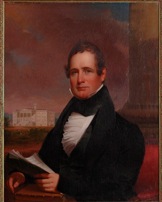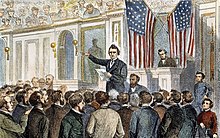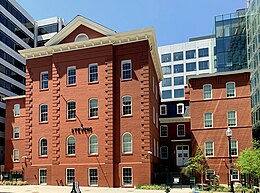Thaddeus Stevens
As the war progressed towards a Northern victory, Stevens came to believe that not only should slavery be abolished, but that black Americans should be given a stake in the South's future through the confiscation of land from planters to be distributed to the freedmen.
His biographer, Hans Trefousse, suggested that another reason for Stevens's virulence was an attack of disease in the late 1820s that cost him his hair (he thereafter wore wigs, often ill-fitting), and "the unwelcome illness may well have contributed to his unreasonable fanaticism concerning the Masons.
[37] According to historian Eric Foner, "When Stevens refused to sign the 1837 constitution because of its voting provision, he announced his commitment to a non-racial definition of American citizenship to which he would adhere for the remainder of his life.
"[55] Stevens took his seat in the 36th United States Congress in December 1859, only days after the hanging of John Brown, who had attacked the federal arsenal at Harpers Ferry hoping to cause a slave insurrection.
"[67] The radicals aggressively pushed the issue, provoking Lincoln to comment: "Stevens, Sumner and [Massachusetts Senator Henry] Wilson simply haunt me with their importunities for a Proclamation of Emancipation.
"[69] Although Lincoln composed his proclamation in June and July 1862, the secret was held within his Cabinet, and the President turned aside radical pleadings to issue one until after the Union victory at the Battle of Antietam in September.
Illinois Representative Isaac Arnold wrote: "distinguished soldiers and citizens filled every available seat, to hear the eloquent old man speak on a measure that was to consummate the warfare of forty years against slavery.
Democrats made allegations of bribery;[81][82] Stevens stated: "the greatest measure of the nineteenth century was passed by corruption, aided and abetted by the purest man in America.
[87] Stevens played a major part in the passage of the Legal Tender Act of 1862 when for the first time, the United States issued currency backed only by its own credit, not by gold or silver.
[89] Although the Legal Tender legislation allowed for the payment of government obligations in paper money, Stevens was unable to get the Senate to agree that interest on the national debt should be paid with greenbacks.
[91] Stevens was unrepentant even as the value of paper currency recovered in late 1864 amid the expectation of Union victory, proposing legislation to make paying a premium in greenbacks for an amount in gold coin a criminal offense.
[106] In May 1865, Andrew Johnson began what came to be known as "Presidential Reconstruction": recognizing a provisional government of Virginia led by Francis Harrison Pierpont, calling for other former rebel states to organize constitutional conventions, declaring amnesty for many southerners, and issuing individual pardons to even more.
[111] Through late 1865, the southern states held white-only balloting and, in congressional elections, chose many former rebels, most prominently Confederate Vice President Alexander Stephens, voted as senator by the Georgia Legislature.
[117] In January 1866, a subcommittee including Stevens and John Bingham proposed two amendments: one giving Congress the unqualified power to secure equal rights, privileges, and protections for all citizens; the other explicitly annulling all racially discriminatory laws.
"[123] When Illinois Senator Lyman Trumbull introduced legislation to reauthorize and expand the Freedmen's Bureau, Stevens called the bill a "robbery" because it did not include sufficient provisions for land reform or protect the property of refugees given them by the military occupation of the South.
[124] Johnson vetoed the bill anyway, calling the Freedmen's Bureau unconstitutional, and decrying its cost: Congress had never purchased land, established schools, or provided financial help for "our own people.
[124] Congress overrode a Johnson veto to pass the Civil Rights Act of 1866 (also introduced by Trumbull), granting African-Americans citizenship and equality before the law and forbidding any action by a state to the contrary.
[143] Despite his opposition to its leader, Stevens worked with the administration on matters both supported; he obtained an appropriation for the purchase of Alaska and urged Secretary of State Seward to seek other territories into which to expand .
Although no seats at Congress were directly at stake, voters in Ohio both defeated a referendum on black suffrage and elected the Democrats to the majority in the legislature, meaning that Wade, whose term was due to expire in 1869, would not be reelected.
The New York Herald described him as having a "face of corpselike color, and rigidly twitching lips ... a strange and unearthly apparition – a reclused remonstrance from the tomb ... the very embodiment of fanaticism, without a solitary leaven of justice or mercy ... the avenging Nemesis of his party – the sworn and implacable foe of the Executive of the nation.
"[177] I repose in this quiet and secluded spot Not from any natural preference for solitude But, finding other Cemeteries limited as to Race by Charter Rules I have chosen this that I might illustrate in my death The Principles which I advocated through a long life;
The Detroit Post stated that "if to die crowned with noble laurels, and ... secure of [recte in] the respect of the world ... is an end worthy the ambition of a well spent life, then the veteran Radical may lie down with the noblest of the fathers to a well contented sleep.
[191] As evidence that their relationship was sexual, Brodie pointed to an 1868 letter in which Stevens compares himself to Richard M. Johnson, vice president under Martin Van Buren, who lived openly with a series of African-American slave mistresses.
"[203] Pulitzer Prize-winning historian James Ford Rhodes argued that though Stevens had a "profound sympathy" towards the African-American, "coming straight from the heart," he also showed "virulence toward the South" and was "bitter and vindictive.
These historians, led by William Dunning, taught that Reconstruction had been an opportunity for radical politicians, motivated by ill will towards the South, to destroy what little of southern life and dignity the war had left.
[207][208] In 1915, D. W. Griffith's film The Birth of a Nation (based on the 1905 novel The Clansman, by Thomas Dixon Jr.) was released, containing the influenceable and ill-advised Congressman Austin Stoneman, who resembles Stevens down to the ill-fitting wig, limp, and African-American lover, Lydia Brown.
Current argued that Stevens was motivated in his Reconstruction policies by frustrated ambitions and a desire to use his political position to promote industrial capitalism and advance the Republican Party.
Controversial in its conclusions for being a psychobiography, it found that Stevens was a "consummate underdog who identified with the oppressed" and whose intelligence won him success, while his consciousness of his clubfoot stunted his social development.
Historian Matthew Pinsker notes that Stevens is referred to only four times in Doris Kearns Goodwin's 2005 book Team of Rivals, on which screenwriter Tony Kushner based the film's screenplay; other radicals were folded into the character.
"[226] The film depicts a Stevens-Smith sexual relationship; Pinsker comments that "it may well have been true that they were lovers, but by injecting this issue into the movie, the filmmakers risk leaving the impression for some viewers that the 'secret' reason for Stevens's egalitarianism was his desire to legitimize his romance across racial lines.








Seated L-R: Benjamin Butler , Stevens, Thomas Williams , John Bingham ;
Standing L-R: James F. Wilson , George S. Boutwell , John A. Logan




